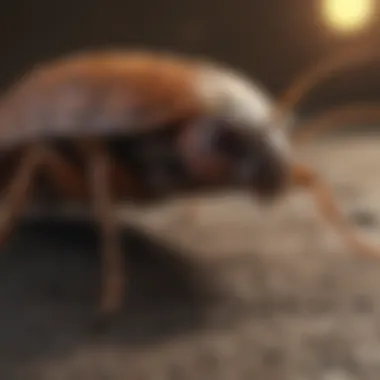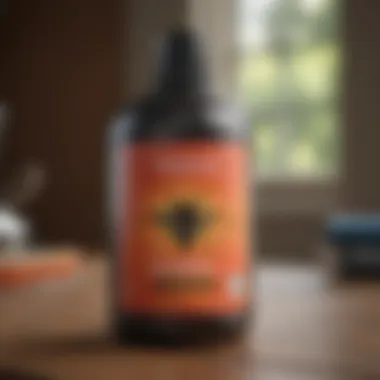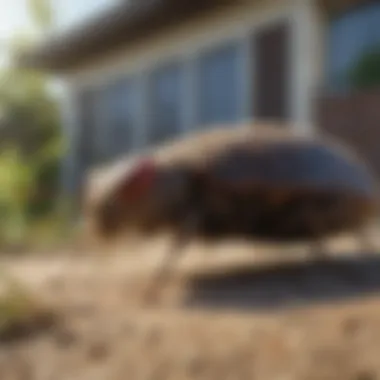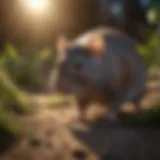Expert Pest Control Services in Sarasota


Preventive Pest Control Strategies
Effective pest control begins with preventative measures. Understanding how to limit pest access to your home is essential. This section provides detailed strategies that cater to your exterior, yard, indoor spaces, and habits surrounding waste disposal.
House Exterior Protection
The exterior of your home serves as the first line of defense against pests. Proper maintenance here can deter many unwanted invaders.
Tips for Sealing Cracks
Examine your house’s foundation and walls for cracks or gaps. Use caulk to seal these openings. Ensure doors and windows close tightly without gaps, and consider adding door sweeps. Sealing reduces entry points for pests.
Clearing Debris
Keep the area around your home clean. Remove leaves, overgrown vegetation, and standing water. This not only improves aesthetics but also minimizes habitats for pests.
Preventing Pests from Entering
Install screens on windows and vents. Be mindful of how outdoor furniture is placed, as it can provide hiding spots for pests. Regularly inspect your home for signs of pest activity.
Yard Maintenance
Your yard can be a breeding ground for pests if not maintained properly. Following essential yard care routines is vital for health and safety.
Essential Yard Care Routines
Mow the lawn frequently and keep shrubs trimmed. Use mulch carefully, as it can harbor pests. Maintain a distance of at least a few feet between flower beds and the foundation of the home.
Methods for Keeping Yard Pest-Free
Plant pest-resistant plants. Consider creating barriers with plants that deter pests naturally, such as marigolds. Regularly watering your yard early in the day reduces moisture levels in the evening when pests are most active.
Indoor Cleanliness
A clean home can limit pest attraction significantly. Implement these expert cleaning tips and techniques to maintain an environment pest-resistant:
Expert Cleaning Tips and Techniques
Adopt a routine that includes sweeping and vacuuming regularly. Pay special attention to kitchens, as food remnants can attract various pests.
Maintaining a Pest-Resistant Indoor Environment
Store food in airtight containers and keep counters clear. Fix leaks quickly to reduce moisture levels. Enforce a no-food rule in bedrooms.
Garbage Disposal
Proper waste disposal is often overlooked but plays a crucial role in pest control.
Efficient Waste Disposal Methods
Use trash cans with tight-fitting lids. Dispose of food waste promptly and consider composting if practical, keeping it enclosed.
Importance of Proper Garbage Disposal
Regularly take out the garbage and clean the bins. A clean area prevents pests from finding food sources, thus discouraging infestations.
Other Pest Prevention Strategies
Consider unique ways to safeguard your home from pests, which can include:
- Using UV light traps indoors to attract and kill flying insects.
- Initiating a pest management routine that involves professional inspections at least once a year.
- Educating family members about identifying signs of a pest invasion and taking swift action.
Remember, prevention is the key to effective pest control. Regular maintenance and vigilance can save you from costly pest management treatments.
Identifying Pest Risk Areas
Having preventative measures is only one part of pest control; identifying areas in and around your home that pose a risk is equally important. Regular inspections can alleviate potential pest issues before they arise.
Moisture Prone Areas Inspection
Dampness often invites pests into your home. Look for places like:
- Basements
- Under sinks
- Around bathtubs and toilets
Check for leaks and resolve any issues promptly. Use dehumidifiers to lower humidity in problem areas.
Crack and Crevice Inspection Guide
Routine inspections are crucial for sealing access points. Areas to inspect include:
- Around plumbing and electrical lines
- Windows and door frames
Proper sealing can prevent many unwanted guests.
Greenery Inspection for Pest Risks
The state of your greenery can heavily influence pest activity. Regularly inspect:
- Bushes and trees for infestations
- The ground for pest habitats
Maintaining your greenery can deter pest presence in your yard and home.
Additional Pest Risk Areas
Other areas to consider include:
- Attics, which can be attractive spaces for rodents.
- Garages, often neglected, where pests can find shelter.
By being aware of these potential risks, you can implement strategies to keep pests at bay.
Effective Pest Control Methods
Identifying the problem is crucial, but knowing how to control pests effectively is equally important. This section explores various methods for keeping pests under control.
Natural Repellents for Pest Control
Not all pest control involves chemicals. Natural solutions can be both safe and effective.
- Essential oils like peppermint, lavender, or tea tree oil can repel many common pests.
Chemical Sprays for Pest Control
For severe infestations, chemical sprays may be necessary. Ensure you:
- Read instructions carefully.
- Maintain safety protocols for children and pets.


Pest Traps: Effective Pest Control Solutions
Pest traps are a practical method of catching unwanted visitors. Depending on the type, traps can be:
- Sticky traps for insects.
- Snap traps or live traps for rodents.
Biological Control Methods for Pest Prevention
Discovering balance in pest management involves using natural predators. For example, introducing ladybugs can control aphid populations effectively.
Other Pest Control Methods
Consider innovative solutions such as ultrasonic pest repellents. They emit sounds that are unpleasant for pests but inaudible to humans.
Pest Species Identification
Understanding the specific pests that invade your home is key to effectively managing them.
Common Insects in Home Pest Control
Insect infestations can vary by location. Look out for:
- Ants, particularly sweet, and protein-seeking species.
- Cockroaches hide in dark corners or near food sources.
- Spiders, which often indicate the presence of other insects.
Identifying Rodents for Pest Prevention
Rodents such as mice and rats can cause significant damage. Signs include:
- Droppings near food sources or nests.
- Gnawed items, particularly wood and insulation.
Bird Species Impacting Home Environments
Birds such as pigeons can create problems with nests and droppings. Inspect roof areas regularly to mitigate issues.
Dealing with Wildlife on Your Property
In some cases, snakes and other wildlife can enter your yard. Establish barriers where necessary and call professionals for removal.
Miscellaneous Pest Species Identification
Certain pests are lesser-known but can affect your home, like bed bugs or pantry pests. Awareness is crucial for managing infestations efficiently.
DIY Pest Control Techniques
Simple DIY techniques can save you time and money in pest control efforts.
Homemade Pest Control Solutions
Creating eco-friendly solutions at home can be effective. Sprays made with vinegar or baking soda can deter some pests.
Using Essential Oils for Pest Control
Emphasize the power of essential oils. Mixing oils in a bottle with water and applying it to problem areas can keep many pests away.
Effective Pest Traps and Barriers
Set up simple traps using household items. For instance, a jar with a small amount of beer can attract and drown pests like slugs.
Top Reputable Pest Control Brands
Consider using effective products from well-known brands like Orkin, Terminix, and Raid to assist in managing pest issues effectively.
Miscellaneous DIY Pest Control Techniques
Explore other unique methods, such as using cucumber slices to deter ants or creating barriers with diatomaceous earth to keep crawling insects at bay.
By utilizing the methods and strategies discussed here, homeowners in Sarasota can effectively prevent and manage pest infestations, ensuring their living environment remains comfortable and pest-free.
Understanding Pest Control
Pest control is crucial for maintaining a healthy living environment. It encompasses a variety of methods to manage or eliminate pests that can cause damage or health risks. Understanding pest control helps in identifying early signs of infestation and taking timely action. Knowledge of pest behavior and habitats also aids in effective prevention strategies. This means a home can be safeguarded not only from current pests but also future invasions.
Definition of Pest Control
Pest control refers to the systematic management of pests that can potentially harm human health, property, and the environment. It involves the use of various techniques to prevent, manage, and eliminate pests. These pests include insects, rodents, and wildlife intruders, which often require specific approaches for effective control.
Types of Pest Control Strategies
Pest control strategies can be categorized into four main types, each with unique characteristics and applications. Understanding these types can lead to better decision-making regarding pest management solutions.
Chemical Control
Chemical control involves the use of pesticides and other synthetic products to kill or repel pests. One key characteristic of chemical control is its immediacy in addressing infestations. The benefits of chemical control include its effectiveness in handling severe pest outbreaks. However, the continuous use of chemicals can lead to resistance, making pests more difficult to control. Furthermore, there may be environmental and health concerns associated with these products, necessitating careful consideration when using them.
Biological Control
Biological control utilizes natural predators, parasites, or pathogens to manage pest populations. It is a beneficial choice as it can promote ecological balance and reduce chemical dependency. The key feature of biological control is its sustainability; it often leads to long-term pest management solutions without adverse effects. However, this strategy may take longer to show results compared to chemical control, which might not be ideal in urgent situations.
Mechanical Control
Mechanical control includes physical methods to eliminate pests, such as traps and barriers. Its main advantage is that it does not involve chemicals, making it a safer alternative for families and pets. Mechanical control is often straightforward and allows for immediate assessment of pest issues. However, its effectiveness can be limited by the type of pest and the scale of the infestation.
Cultural Control
Cultural control focuses on changing farming practices and habits to deter pests. This might include crop rotation, sanitation, and habitat modification. The key characteristic of cultural control is its preventive nature; it aims to reduce conditions that attract pests. It is a beneficial option in agricultural settings where sustainable practices are prioritized. However, changing established practices may take time and require considerable effort in implementation.
Common Pests in Sarasota
Understanding common pests in Sarasota plays a crucial role in effective pest control. Identifying these nuisances helps homeowners take proactive measures. Each pest has unique behaviors and attributes that can influence control strategies. Ultimately, awareness leads to better-informed decisions regarding pest management.
Rodents
Rodents such as mice and rats are prevalent in Sarasota. They adapt quickly to diverse environments, which makes them challenging to eradicate. These animals can cause substantial damage to properties by chewing through wires, insulation, and wood. Moreover, they also pose health risks through diseases they carry, which can transmit to humans.
Preventing rodent infestation starts with sealing entry points around the home. This includes gaps in walls, doors, and windows. Setting traps or calling pest control experts will help manage their populations effectively.
Insects
Termites
Termites are notorious for damaging wooden structures. In Sarasota, these pests can thrive in warm, humid environments. Their ability to consume wood silently makes them particularly dangerous. Homeowners might not even realize they have a problem until significant damage has been done. Hence, regular inspections are vital to detect early signs of infestation. Using bait systems is a popular method to combat termites. However, proactive treatment may be necessary for at-risk properties.
Ants
Ants, especially fire ants and carpenter ants, are common in Sarasota. Their tendency to form large colonies can lead to various issues. Carpenter ants cause structural damage similar to termites, while fire ants can give painful bites. Ant baits can be effective for control, addressing both the workers and the queen. Understanding their trails helps in targeting treatments accurately.
Roaches


Cockroaches are another persistent pest in Sarasota. Species like the American cockroach prefer warm and humid conditions, making homes ideal habitats. They can contaminate food and surfaces with allergens, leading to health concerns. Effective methods to control roaches include traps, gel baits, and professional fumigation when necessary. Sanitation measures play an essential role in preventing infestations.
Bed Bugs
Bed bugs are increasingly common, especially in multi-family units. They feed on human blood and cause itchy bites. Their small size allows them to hide in tight spots, making them difficult to eliminate. Identifying signs of bed bugs is key, which include small blood stains or dark spots on bedding. Thorough inspection and professional pest control treatments are often required for effective management.
Wildlife Intruders
Wildlife like squirrels and raccoons can invade homes in Sarasota. They seek shelter, food, and nesting opportunities in attics and basements. Their presence can lead to structural damage and health issues. Wildlife control often requires humane trapping methods and exclusion techniques.
Squirrels
Squirrels are adept at entering homes through small cracks. They may cause damage by chewing on wiring or insulation. Their nests consist of debris, which can lead to further infestations. Trapping is a common strategy for managing squirrel populations, but prevention through exclusion is essential.
Raccoons
Raccoons are known for rummaging through trash and can pose a threat to gardens. They are clever and capable of opening locks on garbage cans. Moreover, raccoons can gain entry into attics. It is important to secure trash bins and use fencing to protect gardens. When raccoons invade, professional removal is often the best course.
Understanding the behaviors of common pests helps homeowners minimize the risk of infestations. Regular inspection and prompt action can maintain a pest-free environment.
Evaluating Pest Control Services
Evaluating pest control services is crucial for homeowners seeking efficient solutions. Choosing the right service provider can make a significant difference in addressing pest issues effectively. The process holds several advantages. First, it helps to ensure that you are selecting a provider that uses safe and effective methods tailored to your specific pest problem. Also, understanding the services offered can save you time and money. This section will cover critical elements, including selecting a provider, necessary certifications, and cost assessments.
Selecting a Pest Control Provider
When it comes to selecting a pest control provider, there are several factors to consider. Start by researching local companies in Sarasota. Look for reviews and recommendations from neighbors or local community forums. Reliable services should have positive customer feedback and a strong reputation.
Additionally, check for a company’s experience in handling specific pest problems relevant to your situation. For instance, if you are dealing with termites, ensure the provider specializes in termite control. Initially contacting multiple providers can help you narrow down your options. Don't hesitate to ask questions about their methods and how they handle your particular pest issue.
Certifications and Qualifications to Look For
Certifications play an essential role in evaluating pest control services. Licensed companies should meet industry standards and comply with local regulations. Some important certifications include:
- Pesticide Applicator License: Indicates that the company has the required training to handle chemicals safely.
- Certified Pest Control Technician: Shows the personnel are qualified to apply various pest control techniques.
- Green Certification: If you prefer eco-friendly methods, look for providers who hold this certification, indicating a commitment to sustainable practices.
Check if the company is a member of any professional organizations, such as the National Pest Management Association (NPMA). Membership often implies that the company adheres to quality industry standards.
Cost Assessment of Services
Understanding the costs involved in pest control services is essential for budgeting effectively. Pest control pricing can vary based on services provided, size of infestation, and frequency of treatments. Here are some common factors affecting costs:
- Type of Pest: Some pests, like termites, may require more intensive treatments.
- Extent of Infestation: A larger infestation often requires more resources and labor, increasing costs.
- Treatment Frequency: Regular maintenance services might have different pricing structures compared to one-time treatments.
Make sure to obtain quotes from several services before making a decision. Ask for a detailed breakdown of costs. This ensures transparency and helps you avoid hidden charges.
"Getting multiple estimates ensures you understand the average market price for effective pest control services."
Taking the time to evaluate potential providers through these three criteria will lead to informed decisions and ultimately better pest management solutions.
DIY Pest Control Solutions
The realm of pest control is growing, and many homeowners in Sarasota are turning to DIY methods. These solutions provide an accessible approach to managing pests, often with minimal financial investment. Understanding DIY pest control is essential, as it empowers individuals to take charge of their home environment. However, caution must be exercised, as not all DIY methods are effective or safe. This section explores the effectiveness of these methods and common techniques that can be employed.
Effectiveness of DIY Methods
DIY methods can be effective in managing specific pest problems. Their effectiveness often depends on the type of pest and the technique used. For many common pests, like ants and roaches, simple strategies can provide significant relief. However, it's important to note that while some methods may reduce the pest population, they might not completely eradicate it. Homeowners should assess their unique situations before relying solely on DIY methods.
Common DIY Techniques
Traps and Baits
Traps and baits are a prominent method in DIY pest control. They target insect and rodent behavior, making them effective for many common pests. The key characteristic of traps is their ability to capture pests without the use of chemicals, appealing to homeowners looking for safer options.
The unique feature of these traps is that they can range from simple sticky traps to more sophisticated bait stations designed to lure pests in. Their advantages include ease of use and low cost, while disadvantages may include the need for regular monitoring and disposal of captured pests. The effectiveness of traps can vary based on placement and the bait used.
Natural Repellents
Natural repellents offer another avenue for DIY pest control. These substances are often derived from plants and promote an eco-friendly approach to pest management. Their key characteristic is minimal harm to humans and pets, making them attractive to many homeowners.
A unique feature of natural repellents is that they utilize scents or oils that pests find unappealing. Popular examples include peppermint oil for rodents and citronella for insects. Advantages include safety and the pleasant scents they bring. However, natural repellents might need frequent application to maintain effectiveness and may not provide immediate results as synthetic chemicals would.
Sanitation Practices
Sanitation practices form the backbone of effective pest management. By eliminating food sources and hiding spots, homeowners can significantly reduce pest attraction. The key characteristic of sanitation practices is their ability to prevent pests from thriving in your home.
A unique feature of these practices includes routine cleaning of kitchens and dining areas, alongside proper food storage. The advantages of good sanitation practices are substantial, often providing both immediate and long-term benefits. Their disadvantages mainly involve ongoing commitment; without consistent application, the risk of pest resurgence remains high.
Homeowners should integrate these tactics for best results.
Preventive Measures for Pest Control
Preventive measures for pest control are essential in maintaining a pest-free home. This proactive approach can save homeowners significant time, effort, and costs in dealing with pest infestations. Implementing these strategies not only reduces the likelihood of pests but also ensures a healthier living environment.
Regular Maintenance and Inspections
Regular maintenance and inspections are vital components of a successful pest management strategy. Habitual checks allow homeowners to detect early signs of pests, making it easier to mitigate any potential threats. Here are some focus areas for maintenance:
- Check for Entry Points: Regularly inspect areas where pests might enter, such as gaps around doors and windows, vents, and utility lines.
- Inspect for Moisture: Pests like insects and rodents often thrive in damp conditions. Crawl spaces, attics, and basements should be checked for leaks or excessive humidity.
- Clear Clutter: Simplifying storage areas can remove potential hiding spots for pests. Keep attics, garages, and other spaces clutter-free.
The benefits of consistent inspections include minimizing pest populations and reducing the need for intensive control measures down the line.
Home Sealing Techniques
Home sealing techniques can form an invaluable line of defense against pests. By addressing vulnerabilities in the home’s structure, homeowners can effectively keep pests at bay. Important sealing methods include:
- Caulking: Apply caulk around windows, doors, and any cracks in the walls. This creates a barrier that pests cannot penetrate.
- Weatherstripping: Install weatherstripping on doors to close gaps that allow small pests entry.
- Screening: Ensure that all windows and vents are fitted with fine mesh screens to prevent insect intrusion.
Ultimately, investing in these sealing techniques provides long-term benefits, including reduced energy costs and a more comfortable living space.
Landscaping Considerations to Deter Pests
Landscaping plays a crucial role in pest prevention. Thoughtful planting and garden maintenance can significantly reduced pest attraction. Consider the following when planning your landscape:
- Choice of Plants: Select plants that are less attractive to common pests. Native plants tend to be more resistant and require less maintenance.
- Mulch Management: Use mulch sparingly, as it can harbor pests if kept too close to the home’s foundation. Opt for gravel or stone mulch near the perimeter.
- Trim Vegetation: Keep trees and shrubs trimmed and away from the home’s exterior. Overhanging branches can facilitate pest movements.
By integrating these landscaping practices, homeowners can create an environment that deters pests, further contributing to the overall health of their property.
"Preventive measures have a compounding effect; the more you do, the less you will experience pest issues in the future."
These preventive measures empower homeowners to maintain control over pest populations, fostering a safer and more pleasant living space.
The Role of Technology in Pest Control
In recent years, technology has fundamentally transformed the landscape of pest control. The integration of various technological advancements has elevated the effectiveness and efficiency of treatments. For homeowners in Sarasota, understanding these advancements is crucial for making informed decisions regarding pest management strategies.


One significant benefit of technology in pest control is the capacity for precision targeting. Automated systems allow for pinpoint treatments that minimize the use of harmful chemicals. This leads to safer environments, particularly for families with children and pets. Furthermore, technology aids in early detection, helping homeowners catch infestations before they escalate.
Smart Pest Control Devices
Smart pest control devices have emerged as innovative solutions for managing pests at home. These gadgets use sensors and artificial intelligence to detect pest activity and monitor environmental conditions. For example, electronic traps can report captures directly to a smartphone app, allowing for prompt action.
Additionally, smart devices can be programmed to activate repellent methods only when pests are detected, which conserves energy and reduces unnecessary chemical usage. This tech-savvy approach appeals to many homeowners as it combines efficiency with a more environmentally friendly approach.
Users find that these devices not only simplify pest management but also offer peace of mind. The idea of automated monitoring alleviates the constant worry about unseen infestation.
Data-Driven Approaches
Another aspect of technology's role in pest control is the ability to utilize data-driven approaches. Professionals leverage analytics to assess pest patterns and predict potential outbreaks. This method involves collecting data on pest behavior, seasonal trends, and environmental factors that contribute to pest presence.
By employing these insights, pest control companies can develop targeted strategies tailored to the specific needs of the Sarasota area. Such data helps in optimizing the timing and methods of pest treatment, resulting in more effective interventions.
"Data analytics transforms approaches to pest management by taking the guesswork out of pest control."
Choosing the Right Service for Specific Needs
When dealing with pest control, choosing the correct service is crucial. In Sarasota, specific needs often dictate the type of services required. Understanding these nuances allows homeowners and businesses to select reliable solutions that effectively address their pest problems.
Selecting a service means weighing several factors such as effectiveness, cost, and customer support. Each homeowner's situation varies; some might face ant invasions while others may combat rodents or termites. Different strategies are necessary for different pests.
A tailored pest control plan not only maximizes success but minimizes unnecessary expenses and environmental impact. Aligning the choice with pest types, infestation level, and property type plays a vital role in effective pest management strategies.
Commercial vs. Residential Pest Control
Commercial and residential pest control services cater to distinct client needs, both of which require individual attention.
- Commercial Pest Control: Often, businesses face larger-scale infestations due to higher foot traffic and the challenges of maintaining a clean environment. Industries such as restaurants and hotels must adhere to strict health codes. A pest problem could damage reputation and revenue. Accordingly, commercial services may offer advanced detection and extermination techniques tailored for larger properties. Collaborating with pest experts ensures compliance with regulations and provides a quick response to potential infestations.
- Residential Pest Control: Homeowners typically focus on smaller, localized infestations. Residential services often include preventive measures, customized treatment plans, and ongoing maintenance. Effective treatments can be non-invasive, ensuring the comfort of families. Many seek solutions that are child and pet-friendly, adding another layer of consideration.
Choosing the right service often depends on these distinctions. Knowing if a company specializes in commercial or residential services can lead to more effective pest solutions.
Specialized Services for Unique Pest Challenges
Certain pest problems may require specialized services due to their unique nature.
- Termite Specialists: Termites can cause significant structural damage if not detected early. It is essential to select a company that specializes in termite inspections and treatments, employing the latest technologies and safety measures.
- Wildlife Control Experts: Dealing with raccoons or squirrels necessitates specific skills. These pests may require traps or unique removal strategies to ensure humane and effective solutions.
- Bed Bug Extermination Services: Bed bugs are notoriously difficult to eradicate. Specialized services may utilize heat treatments or chemical applications to effectively eliminate infestations.
By acknowledging individual pest challenges and corresponding service requirements, homeowners can find tailored solutions that address their specific needs. This informed approach ensures effective management, ultimately leading to a pest-free environment.
"An informed choice about pest control services can save time, money, and stress for both homeowners and businesses."
Throughout Sarasota, understanding the distinctions between general services and those with specific expertise highlights a necessary part of pest management. Homeowners and businesses must be aware of these factors to ensure they are choosing properly.
In summary, selecting the right pest control service requires a thoughtful assessment of individual needs and the specific pest challenges faced. This ensures effective solutions across commercial and residential properties.
Reviewing the Best Pest Control Companies in Sarasota
Selecting a reliable pest control company is crucial for sustaining a pest-free environment in Sarasota. Given the region's distinct climate and ecological conditions, informed choices on pest control services can prevent infestations and protect property. This section offers a thorough exploration of the top service providers, emphasizing their effectiveness, reputation, and customer satisfaction.
Top Rated Service Providers
In Sarasota, several pest control companies stand out for their commitment to quality service and customer satisfaction. Terminix, Orkin, and PestGuard are among the most esteemed names in the industry. These companies have developed strong reputations through years of effective pest management and customer-centric approaches.
Terminix offers comprehensive pest control plans that cover a variety of pests, including termites and rodents. Their reputation for swift response times and effective treatments makes them a preferred choice for homeowners.
Orkin, renowned for their scientific approach to pest management, utilizes innovative technology to identify and eliminate pests. They provide tailored solutions to address specific pest issues, ensuring long-term protection.
PestGuard focuses on environmentally friendly pest solutions, using natural methods alongside traditional techniques. This approach appeals to homeowners who prioritize sustainability and safety.
Finding the right service provider involves more than just selecting a name from the internet.
Customer Ratings and Testimonials
Customer feedback serves as a crucial indicator of a company's quality and reliability. Websites such as Reddit and various local community forums provide platforms for sharing personal experiences and recommendations.
When reviewing customer ratings, it is important to consider the overall satisfaction rate, response times, and quality of pest management solutions. Terminix often receives praise for its thorough inspections and proactive treatments. Customer testimonials frequently mention the considerable reduction in pest issues following their services.
Meanwhile, Orkin’s commitment to professional training and customer communication places them in high regard. Clients appreciate the technician’s knowledge and the use of transparent treatment methods.
Lastly, PestGuard garners positive reviews for their focus on environmentally safe practices, making them popular among eco-conscious homeowners. Their customers highlight the effectiveness of natural repellents used alongside traditional pest control measures.
"Customer satisfaction is often reflected in repeat business. Building trust through results is what defines the best pest control companies in Sarasota."
Legal and Environmental Considerations
Legal and environmental considerations play a crucial role in pest control. These factors not only help ensure that pest control practices comply with local and national regulations, but they also promote the sustainable use of resources. With increasing awareness about environmental issues, understanding the legal landscape surrounding pest control can guide homeowners in making responsible decisions.
Regulations Governing Pest Control Products
Pest control products are strictly regulated to protect public health and the environment. In Sarasota, as well as the rest of Florida, the Florida Department of Agriculture and Consumer Services (FDACS) oversees the registration and use of pesticides. These regulations ensure that any pest control product used is effective yet safe for both the environment and human health.
Common regulations include:
- Labeling Requirements: All pest control products must be labeled correctly, detailing active ingredients and usage instructions. This ensures consumers are informed about the product they are using.
- Restricted Use Products: Some pesticides are classified as restricted for use only by licensed professionals. Homeowners are advised against using these products without proper training to avoid potential harm.
- Reporting and Record-Keeping: Pest control companies are required to maintain records of pesticide applications, including the types used and the areas treated. This aids in monitoring the impact on the environment and compliance with state laws.
Failure to adhere to these regulations can result in severe penalties for pest control companies. Thus, it is essential for homeowners to select reputable providers who comply with the legal framework.
Sustainability Practices in Pest Control
Sustainability in pest control focuses on long-term solutions that minimize harm to the ecosystem. Modern pest control companies are increasingly adopting eco-friendly methods to align with the growing demand for sustainability.
Examples of sustainable practices include:
- Integrated Pest Management (IPM): This approach uses a combination of strategies to manage pest populations effectively. By prioritizing prevention, monitoring, and minimal interventions, IPM minimizes chemical use and environmental impact.
- Biological Control: Utilizing natural predators or parasites to control pest populations reduces reliance on chemical pesticides. This method often leads to more stable pest control over time.
- Eco-Friendly Products: Many pest control companies now offer products that are less harmful to the environment. These include organic pesticides and natural repellents, which provide effective pest management without detrimental effects.
"By practicing sustainable pest control, we not only protect our homes but also the environment around us."
Understanding these legal and environmental considerations is vital for Sarasota homeowners. Informed choices lead to healthier living spaces and a better environment for future generations.
The End and Future Considerations
In the realm of pest control, understanding both the present circumstances and future directions is essential for homeowners in Sarasota. The final thoughts of this guide are meant to provide clarity and direction regarding effective management of pests. It is important to recognize that an informed approach leads to better decisions when dealing with pest issues. With a variety of strategies available, a tailored approach is advisable, taking into account the specific challenges faced in homes across Sarasota.
Many pest control companies today offer a range of services, including traditional chemical treatments and newer technology-driven solutions. Evaluating these options helps consumers choose effective strategies that suit their environmental values and budget constraints. Furthermore, engaging with pest control services can lead to a long-term partnership that enhances the safety and comfort of one's home.
Summarizing Key Insights
The guide offers key insights that address various aspects of pest control. Readers have learned about:
- The different types of pest control strategies, including chemical, biological, and mechanical methods.
- The common pests specific to Sarasota, detailing how they affect homes and properties.
- Evaluations of professional pest control services, emphasizing the importance of selecting a qualified provider.
- The practicality of DIY solutions and the effectiveness of preventive measures.
By understanding these components, homeowners can better manage their pest control needs, making informed choices that resonate with their specific situations.
The Future of Pest Control in Sarasota
Looking ahead, the future of pest control in Sarasota offers promising developments. As environmental concerns grow, the pest control industry is responding with sustainable practices and innovations. More companies are adopting Integrated Pest Management (IPM) strategies, focusing on long-term prevention and understanding pest life cycles.
Moreover, technology plays an increasing role in pest management. Smart devices that monitor pest activity and data analytics to anticipate infestations are becoming more common, providing homeowners with proactive tools to combat pests before they become an issue. This evolution in pest control not only enhances effectiveness but also supports eco-friendly practices.
In summary, understanding the dynamics of pest control today and anticipating future trends equips Sarasota residents with the knowledge they need. By remaining informed and adaptable, they can ensure a pest-free environment that is both safe and sustainable.



